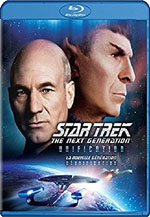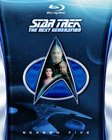Unification

|
|
One of the fifth season's biggest and most obvious gimmicks drew many
excited viewers to their television sets to watch this 2-part story.
Advertisements from the end of the previous week's episode had provided
the draw - the kind of original crew / next gen. crew crossover that
many had been dreaming of since The Next Generation began. Leonard Nimoy
was about to guest star as Spock. Fantastic!
What was actually delivered was not bad per se, but turned out to be
somewhat less exciting than what many fans, myself included, had expected
or hoped for. In hindsight, I'm not sure that the episode's makers
really knew what to do with the main premise of this story, as it
struggles to find true substance for its central dramatic plots,
and ends up giving us a lot of filler in between.
|
Part One's structure is possibly the biggest brain-fart of all.
A fairly dull admiral, whom we've never seen before, gives Picard the
same info that we viewers got from the ad the previous week - that basically
Mr. Spock will be in this episode. Cue the dramatic music - dun, dun, DHUNNN! -
and cut to the opening titles. With baited breath, the audience then endures
the rest of the episode, as it drones on and on and muddles through all manner
of other things. Only at the very end does Spock actually, finally show up,
announcing that he's been found, and - dun, dun, DHUNNN! - "To Be Continued..."
appears on screen. What the hell?
Thus Part One leaves us in exactly the same position in which we started -
still waiting for next week's episode to deliver a crossover drama
with Spock in it. That's pretty bad marketing, bordering on
false advertising. Now we have to wonder, if we do tune in next week,
will we actually get Spock, or will we get shafted yet again?
It might instead have been far more honest to advertise Mark Lenard's appearance
as Spock's father Sarek. Part One at least does deliver a good dose of that,
but whether or not Sarek has anything to do here of great interest may yet
be debated.
One of the big subplots of this story is about healing a rift
between father and son, who don't actually get to meet and interact in this story.
Instead, Captain Picard gets sandwiched between the two of them, and delivers
understanding with a bit of dialogue and a kind of chain-mindmeld. But not only
is this very weird in and of itself, it seems like a kind of pointless re-run.
We saw a rift between Spock and Sarek in the season two episode "Journey to Babel"
in the original series, which kind of looked
like it was resolved then and there. Then at the very end of
"Star Trek 4: The Voyage Home",
father and son had another of their very rare meetings,
and apparently resolved this same issue yet again. It seemed to be over and done with,
and not all that interesting while it lasted. Going through the motions again?
Hmmmph. I'm not sure I saw the point.
The actual MAIN PLOT of this story seems like a very worthy one, for several reasons.
The central idea of two races with common ancestry finding peace with each other
and coming back together seems quite noble and uplifting. But perhaps it tried
to reflect too closely then-recent events concerning the re-unification of Germany
as its eastern and western halves came back together. There is a much greater
difference between the Romulans and the Vulcans at the most fundamental level
of how they live their lives. Namely, Vulcans do one hell of a job to themselves
to live without emotions and pretend that they don't have any. Surely the Romulans
would not be keen to live that way, or to consider that a healthy path for their own
psyches. In the time since the divide, they have probably had opportunity to meet
countless other alien species all helping to convince them that it is possible to
live peacefully and healthily WITH strong emotions, alien species which the Vulcans
did not meet before they made their choice to cut emotions out of their lives and
their culture. Would either culture be comfortable with the other if they suddenly
merged, and had to pretend to be one? Understanding and learning from each other
is great, but merger perhaps not so much.
All that is very philosophically interesting - but then what do you do with it to create
a good drama? For the most part, what we end up with in "Unification" is just a bunch
of people shuffling around and talking in caves, street corners, soup kitchens, and
politicians' offices... discussing intangible ideas and engaging in confused politics
where the audience really doesn't know who or what to root for, if any of it actually
engages their interest. Logistically speaking, there are some great astronomical distances
and political barriers separating many of the characters in this story, but often after
hyping these up early on, the characters are seen to cross these distances and barriers
with great ease, to the point where one forgets there was any great challenge there
to begin with. Thus, large elements of the story's field of conflict appear to
evaporate, suggesting a different overall logistical structure may have been more ideal.
The Final Logic
The most memorable and significant aspect of any of this is simply the fact that
Spock is on screen, here on Romulus, extending another olive branch from the Vulcans,
in similar vein to the way he extended an olive branch from the Federation to the Klingons in
"Star Trek 6: The Undiscovered Country". This story is the
"second" part of that one-two punch that he delivered in 1991 that forever changed
our lasting memory of his character. He had become the peacemaker. No matter how much
conflict erupted or how badly, he would be the one to calmly reopen dialogue with opposing sides
and talk. His logic had found a new philosophy to serve and act upon. At the beginning
of his journey in
"Where No Man Has Gone Before" and
"Balance of Terror", his logic was serving the philosophy and action
of fear and protectionism. He would advocate war, defense, and pre-emptive striking. That was
his logic. Now, it was presented as more logical to continue to remain calm while opening
dialogues, sharing and exchanging culture, and reaching understandings. The guiding philosophy
had aligned itself with love and growth. To Spock's credit, he works at this on both
the grandest political scope he can find as well as in his personal life concerning his father.
It's a powerful shift for him, and yet another statement of vision of the ideals that
Gene Roddenberry wished to share with the world through his Trek series. It is then perhaps
quite fitting that these Trek episodes pay tribute to the passing of Gene Roddenberry with
special opening obituary cards.
Curiously though, when one looks past basic action and digs into the dialogue,
one has to wonder what it is that the Trek writers believe that logic is.
It seems that there has been a growing tendency in the feature films and now again
here to use logic to define an absence of emotion, rather than the solid and proven chain
of steps to take, or causes and effects that must follow each other, all of which may
happen with or without emotion to any degree. Has Spock's switch from a core philosophy
of fear to one of love come from a decision to embrace his Human half more fully? Probably.
Has it come from de-emphasizing logic in favour of other things? I'd hesitate to say so.
Other things have gained favour with him, yes, but it is clear by his energy and charisma,
the way he delivers lines, and the thoughts in his head, that he is still just as logical
as before, only now putting that logic to a new and better purpose.
It is also curious that, though this was shot after the Star Trek 6 feature film,
it aired on television just before Star Trek 6 was released in theatres. These two big
concluding appearances of Leonard Nimoy as Spock first hit audiences in a sequence that
was out-of-chronology for the Spock character. And Spock took the opportunity here
to pre-empt the film and give audiences a little spoiler - essentially how one very early
pivotal scene turned out between himself and the rest of the Enterprise crew, with further
hints about the consequences. Spock puts his actions in the film down to a clumsy mistake on his part,
and explains how this has motivated him to try a different approach with this very similar
situation here. It's a nice bit of comparison and contrast; and of course modern audiences
now watching these two appearances in proper chronological order need not fear the spoiler factor
anymore; it fits together more elegantly for posterity.
All that good stuff acknowledged, it must be noted that the initial cross-over concept
was never going to be exploited properly by placing Spock where the producers would not
allow the Enterprise-D to tread. What fans REALLY wanted was to see Spock interact with
as many of our new TNG regulars as possible, to see what challenges or humorous incidents
might come up, and what new relationships might form. Here, Spock's interactions are
limited to Picard, Data, and to a lesser extent the new incarnation of an old regular
in Sela. And the story really seems to be struggling to find good things for the
other characters to do in their absence.
Interestingly though, one of the guest stars here has ties that go right back to the
very beginning of Star Trek. Malachi Throne playing the role of the Romulan Senator Pardek,
is probably most easily recognized as Commodore Mendez in
"The Menagerie", but also performed the voice of the Keeper
in both that story and the original pilot
"The Cage". One wonders if his casting had anything to do
with making Nimoy feel at home, or attracting him to the project.
The most general black mark against Unification is simply the large quantity of story
padding that audience members are forced to suffer through. Put on display here are
a lot of predictably dull characters doing predictably dull things, from our boring
junk yard operator who sidesteps a few creative twists to do the obvious, to a
four-handed keyboard player who sits at the center of some awful and unnecessary
musical detours. Just when we would really need Rick Berman and Peter Lauritson
to really curb the overindulgence in silly musical directions, they let this rubbish
slip past. Ay caramba! Bring back Ron Jones already, and send the singers home!
Indeed, though this story is generally pretty good for Picard and Data, it really
struggles to find decent things for our other five regulars to do, and doesn't really
succeed as well as it should have.
The plot of Unification picks up considerable steam in its final acts, as Sela
is revealed to be at the top of a pyramid of villains who have a nasty little
scheme that needs to be foiled. Something worthy at last! This section is good,
but won't rise to be one of the Next Generation's greatest adventure conclusions.
There is a bit of tactical creativity here, but opticals are limited, with
some prompting from dialogue causing more to happen in the viewers' imaginations
than can actually be seen on screen.
Curiously, though the Sela character seemed to have great potential to be an on-going
recurring guest villain character, this short snippet is really all that was ever done
with her after her proper introduction in the season opener. The greater opportunity
seems to have been wasted, and I'm not sure why. Another season 5 gimmick falling flat.
Anyway, this does turn out to be a fairly decent adventure for the Next Generation's fifth season,
definitely dull in some places, but unmissable and bordering on profound in others.
A mixed bag that kept us tuning in for more....
|
|









 (regular)
(regular)



